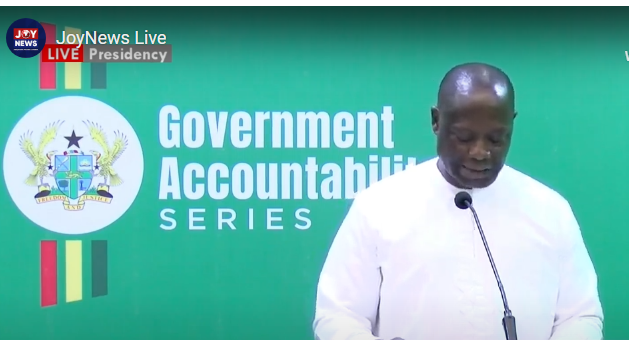
The Minister for Lands and Natural Resources, Emmanuel Armah-Kofi Buah, has announced that the Minerals Commission Act is currently undergoing a comprehensive review aimed at promoting equity, sustainability, and shared prosperity within Ghana’s mining sector.
Addressing the Government Accountability Series at the Jubilee House on Tuesday, 23 July, Mr Buah highlighted the central role of mining in Ghana’s economy and the urgent need for legal reforms to ensure all stakeholders, especially local communities, benefit fairly.
“The mining sector is the lifeline for millions of Ghanaians. Ghana is blessed with an abundance of minerals, gold, diamonds, bauxite, iron, salt, and others. These natural resources are under unprecedented global strain due to rapid population growth, urbanisation, escalating demand for raw materials, and the compounding effects of climate change,” he said.
Mr Buah noted that President John Dramani Mahama’s government is prioritising reforms to ensure the country harnesses its mineral wealth more equitably.
“The Government of President John Dramani Mahama recognises that for Ghana to fully harness the benefits of its mineral wealth, the law must be strengthened to ensure equity, sustainability, and shared prosperity for all stakeholders, especially our communities, which bear the direct brunt of mining activities.”
He disclosed that the review process, which involves extensive stakeholder consultation, is 85% complete. The review covers both the Minerals and Mining Act, 2006 (Act 703), as amended, and the Minerals and Mining Policy of 2014.
Outlined below are key reforms under consideration:
Reducing the tenure of prospecting licences from being held in perpetuity to a defined, minimal period.
Lowering the upper limit for mining leases from the current 30 years to an agreed shorter duration.
Abolishing Development Agreements and introducing mandatory Community Development Agreements (CDAs), requiring companies to contribute an agreed percentage of gross revenue to fund development projects in mining communities.
Establishing a three-tier mineral rights regime by introducing a medium-scale licence category.
Reviewing stability agreements, either by reducing the maximum term from the current 15 years or abolishing them entirely, to be limited only to capital-intensive investments.
Removing the automatic right to renew licences where companies fail to meet specified conditions.
Mr Buah reaffirmed government’s commitment to fairness, transparency, and inclusivity in shaping the future of Ghana’s mining sector.
“Under the leadership of President John Dramani Mahama, and with extensive stakeholder engagements that include traditional authorities, civil society groups, and academia, government is committed to ensuring that the review of the Act corrects the imbalances of the past and secures a brighter future for the benefit of all Ghanaians.”
DISCLAIMER: The Views, Comments, Opinions, Contributions and Statements made by Readers and Contributors on this platform do not necessarily represent the views or policy of Multimedia Group Limited.
DISCLAIMER: The Views, Comments, Opinions, Contributions and Statements made by Readers and Contributors on this platform do not necessarily represent the views or policy of Multimedia Group Limited.


